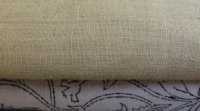MESH Design Studio
Made Hand-in-Hand With Nature.
There is a special story behind this range of hand woven, vegetable dyed and vegetable printed fabrics which are sustainable, ecologically sound and created by hand.
MESH has worked with a women’s society in a leprosy colony called Jone Pryadarshini Mahila Mandal (JPMM) for a number of years. Our focus has been to provide a steady flow of orders for the members who can sew, and we have had some success. But our goal has always been to encourage them to make products in fabrics that are locally available in their region which is the states of Andhra Pradesh and Telangana in S. India.

Our dream came true last year when MESH designer was introduced to Malkha an organization based out of Hyderabad that since 2003 has been focusing on a sustainable field-to-fabric cotton textile chain, collectively owned and managed by the primary producers. At present spinners, dyers and weavers are engaged in understanding and evolving the practice of collective working. Once ginning is introduced, farmers and ginners will also be part of the initiative.
The Malkha process explores an alternative providing the missing link in a fully rural cotton textile industry using local raw material and local skills. It allows people to work near their homes rather than having to move to cities thereby creating a strong link between farming and local textile production which empowers the rural society both socially and politically.
These are the social effects - what of the fabrics themselves….sustainable, ecologically sound and unique
Weaving
The cloth is hand-woven using bamboo or millet stalk reeds which are flexible allowing the natural slubs in the yarn to slip through giving the fabric a depth and texture. This hand woven fabric ensures that the natural qualities of cotton retained during yarn-making are also preserved in the cloth.

Dyeing
Natural dyeing using plant-based dyestuffs produces a variety of beautiful dyed fabrics with no environmental pollution. The yarns and fabrics to be dyed are first prepared with mordants so that they can absorb the natural dyes resulting in the wonderful colours seen in these products. The distinctive blue is indigo, pomegranate rind is used for yellow and Acacia Catechu for brown. Red is the only non-plant based dye, it is made of non-toxic alizarin, a by-product of coal tar.

Printing
Printing of Malkha cloth is done using blocks carved out of seasoned teakwood. For natural dye printing, the cloth to be printed is prepared by mordanting with harda, dried in sunlight and then washed. For the actual printing, the fabric is stretched on a table and stamped with the blocks one colour at a time. Each colour in the design is printed with a different block, and there can be several colours, and therefore blocks, for a design.

Sewing
Using these wonderful regional fabrics JPMM tailors work on their treadle sewing machines beside a garden of coconut and pomegranate trees creating home décor products for customers who care about the environment, the dignity of labour and natural beauty.
Sep 2015
MESH has worked with a women’s society in a leprosy colony called Jone Pryadarshini Mahila Mandal (JPMM) for a number of years. Our focus has been to provide a steady flow of orders for the members who can sew, and we have had some success. But our goal has always been to encourage them to make products in fabrics that are locally available in their region which is the states of Andhra Pradesh and Telangana in S. India.

Our dream came true last year when MESH designer was introduced to Malkha an organization based out of Hyderabad that since 2003 has been focusing on a sustainable field-to-fabric cotton textile chain, collectively owned and managed by the primary producers. At present spinners, dyers and weavers are engaged in understanding and evolving the practice of collective working. Once ginning is introduced, farmers and ginners will also be part of the initiative.
The Malkha process explores an alternative providing the missing link in a fully rural cotton textile industry using local raw material and local skills. It allows people to work near their homes rather than having to move to cities thereby creating a strong link between farming and local textile production which empowers the rural society both socially and politically.
These are the social effects - what of the fabrics themselves….sustainable, ecologically sound and unique
Weaving
The cloth is hand-woven using bamboo or millet stalk reeds which are flexible allowing the natural slubs in the yarn to slip through giving the fabric a depth and texture. This hand woven fabric ensures that the natural qualities of cotton retained during yarn-making are also preserved in the cloth.

Dyeing
Natural dyeing using plant-based dyestuffs produces a variety of beautiful dyed fabrics with no environmental pollution. The yarns and fabrics to be dyed are first prepared with mordants so that they can absorb the natural dyes resulting in the wonderful colours seen in these products. The distinctive blue is indigo, pomegranate rind is used for yellow and Acacia Catechu for brown. Red is the only non-plant based dye, it is made of non-toxic alizarin, a by-product of coal tar.

Printing
Printing of Malkha cloth is done using blocks carved out of seasoned teakwood. For natural dye printing, the cloth to be printed is prepared by mordanting with harda, dried in sunlight and then washed. For the actual printing, the fabric is stretched on a table and stamped with the blocks one colour at a time. Each colour in the design is printed with a different block, and there can be several colours, and therefore blocks, for a design.

Sewing
Using these wonderful regional fabrics JPMM tailors work on their treadle sewing machines beside a garden of coconut and pomegranate trees creating home décor products for customers who care about the environment, the dignity of labour and natural beauty.
Sep 2015
